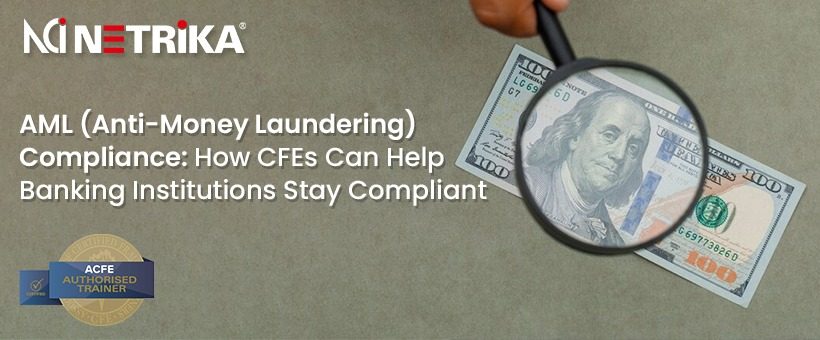News & Events
AML (Anti-Money Laundering) Compliance: How CFEs Can Help Banking Institutions Stay Compliant
- July 12, 2024
- Posted by: marketing@netrika.com
- Category: Blogs

AML (Anti-Money Laundering) Compliance
Real-time payment rails are allowing the banking industry to handle payments in real-time or almost real-time. Payments start, clear, and settle in a matter of seconds. While this evolution drew more services and better customer satisfaction, it also attracted malicious people who were looking for quick cash. Certified Fraud Examiners are experts in anti-money laundering services, have knowledge of cutting-edge technology, and are adept at implementing best practices to enable banking institutions to stay compliant. CFEs securely implement onboarding coordination, real-time payment processing, payment screening, and new account monitoring in accordance with anti-money laundering regulations to protect the bank’s vital assets that uphold its reputation for integrity.
How CFEs help banking institutions stay compliant with anti-money laundering regulations
Banks maintain the stability of the financial system and the protection of their clients under stringent and extensive regulatory frameworks. CFEs help make sure banks follow these guidelines. Their vast understanding of laws such as the Bank Secrecy Act (BSA), Sarbanes-Oxley Act (SOX), and anti-money laundering (AML) statutes is put to use in creating efficient compliance programs.
In order to stop money laundering which is also associated with terrorism financing, CFEs implement KYC and anti-money laundering strategies as outlined in depth in banking legislation to preserve the integrity of the banking institutions. KYC is regulation compliance that the banks must follow to stop financial crime and identity theft. On the other side, anti-money laundering laws and regulations, or AML regulations, use transaction monitoring, employee compliance programs, reporting requirements, and customer due diligence to detect criminals engaged in money laundering. CFEs further this requirement through their expert skill set.
CFEs contribute to financial and security policy development through their innovative ideas, perspectives, and expertise. CFE specialists can identify flaws and weaknesses in anti-fraud measures, allowing for their removal or modification. They contribute to the creation of improved policies and procedures that use cutting-edge technology to fight fraud by utilizing their knowledge. These guidelines could include job segregation, double-checking financial activities, and recurring audits that serve as checkpoints to ensure compliance. Organizations are better able to adjust to new risks and regulatory changes when a CFE guarantees that policies are in line with industry standards and comply with legal obligations.
CFEs can meticulously identify red flags in the existing systems and control procedures, They perform thorough audits to make sure internal control systems are competitive with external systems in place that reduce fraud risks. The organization’s risk profile serves as the foundation for CFE feedback. and rely on the knowledge of experts in control measures who may advise businesses on how to prevent fraud. CFEs improve access controls and set up whistleblower hotlines as part of preventive measures in the event of any suspicious anti-money laundering activity. They create an internal barrier to money laundering and foster an honest and accountable culture in banks.
CFEs cover both the basic understanding of the banking industry and the evolving regulatory and compliance landscape around financial irregularities. They ensure that banks take their time to stay compliant by monitoring changes to laws, regulations, and industry guidelines in their capacity as watchdogs. To help the banking institutions comply with regulatory surroundings, CFEs create statutory provisions and participate in the organization’s change management procedures. They also create compliance rules and guidelines that address particular regulatory provisions.
Much of a bank’s capacity to stop money laundering depends on its ability to recognize and identify it. CFEs help the banking institutions in this endeavor by collaborating closely with senior management to guarantee that ethical issues are smoothly incorporated into decision-making, CFEs enhance institutional integrity, and strong internal controls, like access limits, and transaction monitoring systems, to prevent money laundering.

